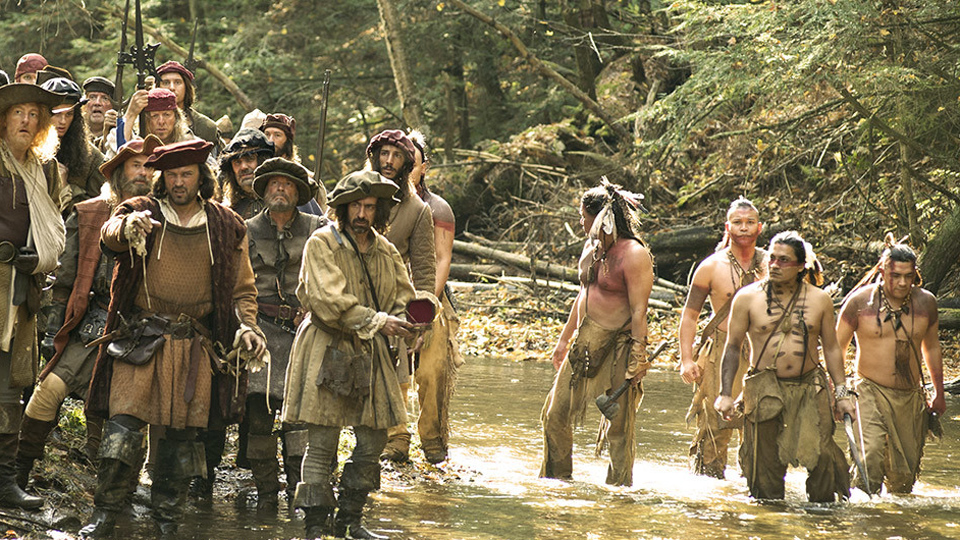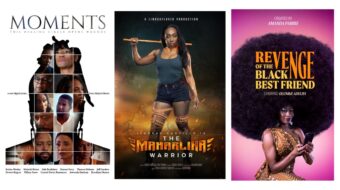
TORONTO — “I would like to acknowledge that we are on the traditional territory of the Mississauga’s of New Credit First Nation, the Haudenosaunee and the Huron Wendat, and we thank them for hosting us on their land today and every day of the year.”
This is the statement every presenter made at each of the over 600 film screenings at this year’s Toronto International Film Festival. TIFF is an amazing opportunity to experience the world, not only in the present, but at various times throughout history. Where else is this possible except through film? Add some of the most informed filmgoers in the world offering stimulating and intelligent question and answer sessions to a wealth of valuable films for progressives addressing many of the important issues that concern us today, and you have one of the most valuable cultural experiences in the Western Hemisphere.
Of the many themes weaving throughout the ten-day film feast, one of the most prevalent was the subject of Indigenous people, their lost rights and the tragic history of the occupation of their lands. Some say there was far less destruction and carnage in Canada compared to the historic well-documented genocide elsewhere in North America. Tens of millions eventually were killed in the Western Hemisphere—poisoned, diseased, starved or worked to death, obliterated from history.
This is a tragic tale white Americans have yet to deal with. Canadians are also addressing their government’s calculated destruction of Native culture and land. Many children were systematically removed from their families and homes and placed in Christian communities where their language and history were erased from memory.
One of Canada’s premier Native filmmakers, Alanis Obomsawin, has donated her life to telling rich and poignant stories of her people. Introduced for the debut of her newest film, Our People Will Be Healed, she was described as a “fierce advocate for Indigenous people. Her body of work has given voice to many Indigenous communities, and her films tell truths about Canada that all Canadians need to hear.”
This latest film, much more optimistic that her previous angry shouts for justice, is a glimpse into what action-driven decolonization is into now. The 85-year-old activist has won many honors, including the country’s highest awards. She says, “As I travel around this country, I notice there have been big changes. I sense Canadians listening to us, with big changes in all levels of education. Canada is now teaching the real history of our people and our country. There are more jobs available, and respect—it’s a very different time now, we’ve never been there before. Canadians want to learn more and they want to see changes and want to see justice.”
Obomsawin passionately stated, “Young people now are getting involved, marching to stop the epic of suicide.” In her new film she tells a moving story about a young man who tried to kill himself, who unexpectedly survived and changed his life forever. He saw the importance and power of going back to his Native roots and learning about working together in community.
The filmmaker appeared at the premiere wearing red to honor those who are gone, saying it represents the blood from the many murdered and missing Native women and children, and the bloody colonialist policies that attempted to destroy their people.
But this film is beautiful and positive, covering a championship music jamboree at Norway House that attracts a huge Native community involving hundreds of children in the joy of creating music. A Cree teacher interviewed in the film noticed that young Native children were losing their original language at home. “Language is most important for any human being. There was a law in Canada against speaking the language. They were told by Christians they were speaking the language of Satan. It’s only lately that they are now teaching Cree language.”
After decades of filmmaking, Obomsawin’s previous anger is substituted for a more gentle approach to the subject. “For a change I feel I didn’t have to do that.” Norway House, the largest Native community in Manitoba, offers a vision of what can be.
Another epic study of Native history is the fascinating time travel tale that takes place at five critical times in Montreal history covering a span of over 800 years. Hochelaga—Land of the Souls is directed by famed Canadian director François Girard (Thirty Two Short Films About Glenn Gould, The Red Violin), who seems to like stories about the expanse of history.
The remarkable storyline begins with a large sinkhole that forms in a football field during a heavy rainstorm in the center of Montreal, or Hochelaga as Natives called it. During a critical tackle involving many players, the ground gives way, and one player falls deep into the hole. As the camera follows him deep into the ground the story dissolves into the year 1267, when a tragic Native war took place on the same spot. A tribal elder facing the dead bodies covering the land pleads that we have to stop hate and war, a forewarning of times to come. Further time segments take us to colonial conquests, a deadly epidemic in 1687, the Rebellion of 1837 and other fascinating historical experiences that shaped Montreal and Canada as a whole. It’s a revealing and respectful study of Canada’s First Nations.
One more film at TIFF addressing the subject of First Nations is Alan Zweig’s There Is a House Here. Zweig won a Platform Award at TIFF in 2013 for his documentary When Jews Were Funny, but here he tackles a more serious subject that almost gets out of control. Confessing to know little about the subject and using an abrasive citified approach to gather facts on the plight of Natives in Canada, Zweig at first comes across as a caustic, ignorant interloper invading the lives of Inuit people living a totally different lifestyle in frigid northern Canada. His street talk and swearing were not welcomed at a lot of homes that his well-connected female Native associate hooked him up with. But she persevered, and he eventually mellowed and acquired some very privileged and eye-opening intimate interviews that make this film a must-see.
Author’s Note: Some of the films shown at film festivals have likely not yet been bought by a distributor. It may take some time before they turn up locally in theatres, or can be viewed on television or Netflix. Please search for these titles on People’s World and you’ll be able to re-read our reviewer’s take on them.












Comments